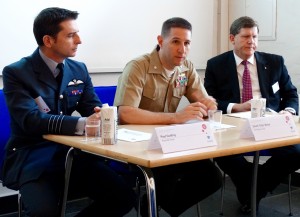Air Vice-Marshal John Blackburn AO (Retd.) is a leading Australian strategist.
He has most recently been Deputy Chairman of both the Kokoda Foundation and the Williams Foundations where he has led key efforts to reshape Australian and allied thinking about defense transformation appropriate to the evolving strategic environment.
John Blackburn joined the Air Force in 1975.
 The Blackburn-Berke-Godfrey panel addressing airpower transformation at the Copenhagen Airpower Symposium, April 17, 2015. Credit: SLD
The Blackburn-Berke-Godfrey panel addressing airpower transformation at the Copenhagen Airpower Symposium, April 17, 2015. Credit: SLD
As a fighter pilot he flew the Mirage III aircraft.
In 1980 he graduated from the Empire Test Pilots School at RAF Boscombe Down in the UK and then served as a test pilot with Aircraft Research and Development Unit at Edinburgh, South Australia.
In 1983 he was assigned to the fighter project team in the USA managing the introduction of the F/A-18 Hornet fighter aircraft into RAAF service.
On return to Australia in 1987 he spent several years flying F/A-18s operationally with No. 77 Squadron, as Flight Commander, Executive Officer, and returning later as the Commanding Officer.
In 1996 he was promoted and appointed to command No. 41 Wing, in charge of all military air defence radar / C2 and surveillance units and all Military ATC.
His later appointments included the Director General Policy and Plans in Air Force Headquarters, the Director General of Military Strategy in Defence Headquarters.
On promotion to Air Vice-Marshal in 2002, he became Head of Strategic Policy for Defence.
In this latter position he was responsible for the development of ADF strategic policy and led the development of the Defence Joint Vision, the Future War Fighting Concept and the Network-Centric Warfare Concept and Roadmap for the ADF.
In 2004 John was appointed the Commander of the Integrated Area Defence System located in Malaysia, commanding a multi-national headquarters established to effect the Five Power Defence Arrangements (FPDA). Under these arrangements, he oversaw bi-annual military exercises over Peninsula Malaysia, Singapore and the South China Sea.
John returned to Canberra in 2005, to the position of Deputy Chief of Air Force.
In this role he was responsible for Air Force’s strategic plans and policy, capability plans, financial resources, personnel policy and career management.
He also served as the Airworthiness regulator for all Defence Force Aviation and as a Board chairman for Australian Defence Airworthiness Boards.
He was appointed an Officer of the Order of Australia in 2008.
He retired from full time service in the RAAF in September 2008 with 3000 hours experience as a test pilot and fighter pilot in over 20 aircraft types.
He is now a consultant in the fields of Defence and National Security and remains on the RAAF Reserve.

